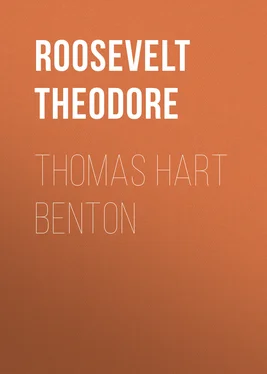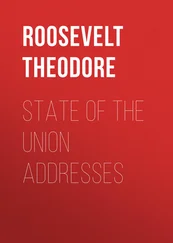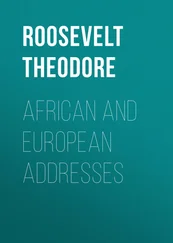Theodore Roosevelt - Thomas Hart Benton
Здесь есть возможность читать онлайн «Theodore Roosevelt - Thomas Hart Benton» — ознакомительный отрывок электронной книги совершенно бесплатно, а после прочтения отрывка купить полную версию. В некоторых случаях можно слушать аудио, скачать через торрент в формате fb2 и присутствует краткое содержание. Жанр: foreign_prose, История, foreign_edu, foreign_antique, на английском языке. Описание произведения, (предисловие) а так же отзывы посетителей доступны на портале библиотеки ЛибКат.
- Название:Thomas Hart Benton
- Автор:
- Жанр:
- Год:неизвестен
- ISBN:нет данных
- Рейтинг книги:4 / 5. Голосов: 1
-
Избранное:Добавить в избранное
- Отзывы:
-
Ваша оценка:
- 80
- 1
- 2
- 3
- 4
- 5
Thomas Hart Benton: краткое содержание, описание и аннотация
Предлагаем к чтению аннотацию, описание, краткое содержание или предисловие (зависит от того, что написал сам автор книги «Thomas Hart Benton»). Если вы не нашли необходимую информацию о книге — напишите в комментариях, мы постараемся отыскать её.
Thomas Hart Benton — читать онлайн ознакомительный отрывок
Ниже представлен текст книги, разбитый по страницам. Система сохранения места последней прочитанной страницы, позволяет с удобством читать онлайн бесплатно книгу «Thomas Hart Benton», без необходимости каждый раз заново искать на чём Вы остановились. Поставьте закладку, и сможете в любой момент перейти на страницу, на которой закончили чтение.
Интервал:
Закладка:
One of the first subjects that attracted Benton's attention in the Senate was the Oregon question, and on this he showed himself at once in his true character as a Western man, proud alike of every part of his country, and as desirous of seeing the West extended in a northerly as in a southerly direction. Himself a slave-holder, from a slave state, he was one of the earliest and most vehement advocates of the extension of our free territory northwards along the Pacific coast. All the country stretching north and south of the Oregon River was then held by the United States in joint possession with Great Britain. But the whole region was still entirely unsettled, and as a matter of fact our British rivals were the only parties in actual occupation. The title to the territory was doubtful, as must always be the case when it rests upon the inaccurate maps of forgotten explorers, or upon the chance landings of stray sailors and traders, especially if the land in dispute is unoccupied and of vast but uncertain extent, of little present value, and far distant from the powers claiming it. The real truth is that such titles are of very little practical value, and are rightly enough disregarded by any nations strong enough to do so. Benton's intense Americanism, and his pride and confidence in his country and in her unlimited capacity for growth of every sort, gifted him with the power to look much farther into the future, as regarded the expansion of the United States, than did his colleagues; and moreover caused him to consider the question from a much more far-seeing and statesmanlike stand-point. The land belonged to no man, and yet was sure to become very valuable; our title to it was not very good, but was probably better than that of any one else. Sooner or later it would be filled with the overflow of our population, and would border on our dominion, and on our dominion alone. It was therefore just, and moreover in the highest degree desirable, that it should be made a part of that dominion at the earliest possible moment. Benton introduced a bill to enable the president to terminate the arrangement with Great Britain and make a definite settlement in our favor; and though the Senate refused to pass it, yet he had the satisfaction of bringing the subject prominently before the people, and, moreover, of outlining the way in which it would have to be and was finally settled. In one of his speeches on the matter he said, using rather highflown language, (for he was unfortunately deficient in sense of humor): "Upon the people of Eastern Asia the establishment of a civilized power on the opposite coast of America could not fail to produce great and wonderful benefits. Science, liberal principles in government, and the true religion might cast their lights across the intervening sea. The valley of the Columbia might become the granary of China and Japan, and an outlet to their imprisoned and exuberant population." Could he have foreseen how, in the future, the Americans of the valley of the Columbia would greet the "imprisoned and exuberant population" of China, he would probably have been more doubtful as to the willingness of the latter empire to accept our standard of the true religion and liberal principles of government. In the course of the same speech he for the first time, and by what was then considered a bold flight of imagination, suggested the possibility of sending foreign ministers to the Oriental nations, to China, Japan, and Persia, "and even to the Grand Turk."
Better success attended a bill he introduced to establish a trading-road from Missouri through the Indian country to New Mexico, which, after much debate, passed both houses and was signed by President Monroe. The road thus marked out and established became, and remained for many years, a great thoroughfare, and among the chief of the channels through which our foreign commerce flowed. Until Benton secured the enactment of this law, so important to the interests and development of the West, the overland trade with Mexico had been carried on by individual effort and at the cost of incalculable hazard, hardship, and risk of life. Mexico, with its gold and silver mines, its strange physical features, its population utterly foreign to us in race, religion, speech, and ways of life, and especially because of the glamour of mystery which surrounded it and partly shrouded it from sight, always dazzled and strongly attracted the minds of the Southwesterners, occupying much the same place in their thoughts that the Spanish Main did in the imagination of England during the reign of Elizabeth. The young men of the Mississippi valley looked upon an expedition with one of the bands of armed traders, who wound their way across Indian-haunted wastes, through deep canyons and over lofty mountain passes, to Santa Fé, Chihuahua, and Sonora, with the same feelings of eager excitement and longing that were doubtless felt by some of their forefathers more than two centuries previously in regard to the cruises of Drake and Hawkins. The long wagon trains or pack trains of the traders carried with them all kinds of goods, but especially cotton, and brought back gold and silver bullion, bales of furs and droves of mules; and, moreover, they brought back tales of lawless adventure, of great gains and losses, of fights against Indians and Mexicans, and of triumphs and privations, which still further inflamed the minds of the Western men. Where they had already gone as traders, who could on occasion fight, they all hoped on some future day to go as warriors, who would acquire gain by their conquests. These hopes were openly expressed, and with very little more idea of there being any right or wrong in the matter than so many Norse Vikings might have felt. The Southwesterners are credited with altogether too complex motives when it is supposed that they were actuated in regard to the conquest of northern Mexico by a desire to provide for additional slave states to offset the growth of the North; their emotions in regard to their neighbor's land were in the main perfectly simple and purely piratical. That the Northeast did not share in the greed for new territory felt by the other sections of the country was due partly to the decline in its militant spirit, (a decline on many accounts sincerely to be regretted,) and partly to its geographical situation, since it adjoined Canada, an unattractive and already well-settled country, jealously guarded by the might of Great Britain.
Another question, on which Benton showed himself to be thoroughly a representative of Western sentiment, was the removal of the Indian tribes. Here he took a most active and prominent part in reporting and favoring the bills, and in advocating the treaties, by which the Indian tribes of the South and West were forced or induced, (for the latter word was very frequently used as a euphemistic synonym of the former,) to abandon great tracts of territory to the whites and to move farther away from the boundaries of their ever-encroaching civilization. Nor was his action wholly limited to the Senate, for it was at his instance that General Clark, at St. Louis, concluded the treaties with the Kansas and Osage tribes, by which the latter surrendered to the United States all the vast territory which they nominally owned west of Missouri and Arkansas, except small reserves for themselves. Benton, as was to be expected, took the frontier view of the Indian question, which, by the way, though often wrong, is much more apt to be right than is the so-called humanitarian or Eastern view. But, so far as was compatible with having the Indians removed, he always endeavored to have them kindly and humanely treated. There was, of course, much injustice and wrong inevitably attendant upon the Indian policy advocated by him, and by the rest of the Southern and Western statesmen; but it is difficult to see what other course could have been pursued with most of the tribes. In the Western States there were then sixty millions of acres of the best land, owned in great tracts by barbarous or half-barbarous Indians, who were always troublesome and often dangerous neighbors, and who did not come in any way under the laws of the states in which they lived. The states thus encumbered would evidently never have been satisfied until all their soil was under their own jurisdiction and open to settlement. The Cherokees had advanced far on the road toward civilization, and it was undoubtedly a cruel grief and wrong to take them away from their homes; but the only alternative would have been to deprive them of much of their land, and to provide for their gradually becoming citizens of the states in which they were. For a movement of this sort the times were not then, and, unfortunately, are not yet ripe.
Читать дальшеИнтервал:
Закладка:
Похожие книги на «Thomas Hart Benton»
Представляем Вашему вниманию похожие книги на «Thomas Hart Benton» списком для выбора. Мы отобрали схожую по названию и смыслу литературу в надежде предоставить читателям больше вариантов отыскать новые, интересные, ещё непрочитанные произведения.
Обсуждение, отзывы о книге «Thomas Hart Benton» и просто собственные мнения читателей. Оставьте ваши комментарии, напишите, что Вы думаете о произведении, его смысле или главных героях. Укажите что конкретно понравилось, а что нет, и почему Вы так считаете.












